I-TECH in Ukraine has worked to implement the Training System Monitoring and Reporting Tool (TrainSMART) via its partners, supporting adaptation of the tool per partners’ specifications and training stakeholders on its use since 2013.
Author: itechadmin
Human Resources for Health in Ukraine
A key focus for I-TECH in Ukraine is strengthening the capacity of local partners to develop and deliver high-quality clinical trainings and expand the supply of skilled health care workers.
Workforce Development in Haiti
It is critical that health care providers receive the necessary training to empower them to improve patient outcomes CHARESS supports both pre-service and in-service training efforts in Haiti. In particular, CHARESS is a key partner of MSPP in maintaining its national clinical guidelines. Continue reading “Workforce Development in Haiti”
Health Information Systems in Haiti
Electronic medical record (EMR) systems have the capacity to improve clinical decision making and quality of care at site level but can also be leveraged to make data-driven, population-level public health decisions. At the request of the MSPP Continue reading “Health Information Systems in Haiti”
Continuous Quality Improvement in Haiti
In partnership with CDC, CHARESS helps the Haitian MSPP to implement the national care improvement program, HealthQual, by training providers on quality improvement concepts and using data from the EMR, iSanté, for clinical decision making and improved care. Continue reading “Continuous Quality Improvement in Haiti”
Clinical Mentoring in Haiti
I-TECH introduced its clinical mentoring program in Haiti in 2006. A team of physicians, nurses, and psychologists provide technical assistance to 20 sites in the MSPP care and services network to help strengthen HIV- and AIDS-related services. During site visits, CHARESS mentors conduct clinical rounds Continue reading “Clinical Mentoring in Haiti”
I-TECH Ukraine Conducts ARVs for Epidemic Control Workshop
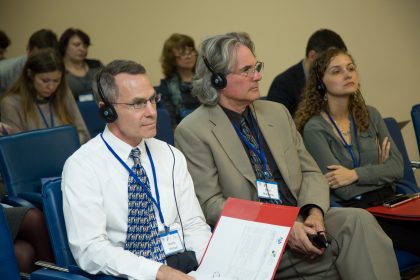
In early April, the International Training and Education Center for Health (I-TECH) conducted a five-day workshop on “Antiretroviral Drugs for Epidemic Control” for more than 50 chief doctors and deputy chief doctors from Regional AIDS Centers in Ukraine.
Workshop participants learned about evidence-based, international best clinical practices and the cost-effectiveness of strategies for using antiretroviral therapy (ART) to control HIV epidemics. International keynote speakers included:
- Dr. Jeremy Penner, International Clinical Advisor in Ukraine to I-TECH/University of Washington (UW);
- Dr. Elliot Marseille, Consultant to I-TECH/UW and the Center for Global Surgical Studies at the University of California, San Francisco;
- Dr. Michael Martin, U.S. Centers for Disease Control and Prevention (CDC) Senior Technical Advisor for HIV/AIDS care and treatment in Thailand; and
- Dr. Juliana de Fatima da Silva, Epidemic Intelligence Service Officer at the CDC.
The pool of facilitators also included nine national experts from the Ministry of Health’s Center of Public Health (CPH).
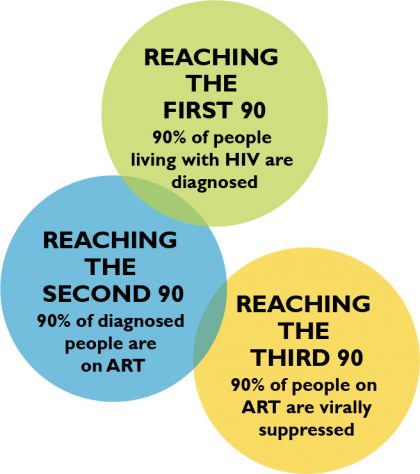 The workshop aimed to support the development of efficient strategies to achieve the UNAIDS 90-90-90 goals: 90% of HIV-positive people know their status, 90% of those are on treatment, and 90% of those are virally suppressed. To this end, the workshop covered national situational analysis, national clinical recommendations, and service delivery models with the highest potential for adaption in country.
The workshop aimed to support the development of efficient strategies to achieve the UNAIDS 90-90-90 goals: 90% of HIV-positive people know their status, 90% of those are on treatment, and 90% of those are virally suppressed. To this end, the workshop covered national situational analysis, national clinical recommendations, and service delivery models with the highest potential for adaption in country.
Progress on ART optimization in Ukraine was shared, and participants were able to discuss their experiences and ideas for improving HIV-related services. The presentations and group discussions were particularly timely, given the development of complex new HIV clinical guidelines currently under way in Ukraine – they also provided much needed evidence to support this process.
Similar workshops were requested by the CPH and leaders of the Regional AIDS Centers, and I-TECH plans to meet this request by conducting two workshops in June and September 2017.
THIS PROJECT IS SUPPORTED BY THE HEALTH RESOURCES AND SERVICES ADMINISTRATION (HRSA) OF THE U.S. DEPARTMENT OF HEALTH AND HUMAN SERVICES (HHS) UNDER U91HA06801, THE INTERNATIONAL AIDS EDUCATION AND TRAINING CENTER (IAETC). THE CONTENT OF THIS POST IS THE AUTHOR’S AND SHOULD NOT BE CONSTRUED AS THE OFFICIAL POSITION OR POLICY OF, NOR SHOULD ANY ENDORSEMENTS BE INFERRED BY HRSA, HHS OR THE U.S. GOVERNMENT.
Guyana Revamps Its Health Information System with I-TECH Support

The International Training and Education Center for Health (I-TECH) recently partnered with the Ministry of Public Health in Guyana and the U.S. Centers for Disease Control and Prevention (CDC) to launch a new health information system (HIS) that will protect patients’ privacy, maintain confidentiality, and provide security for sensitive data.
In an article in Guyana’s Kaieteur News, Deputy Chief Medical Officer, Dr. Karen Boyle, described how health officials hope to reduce health service quality inequities between coastal regions and other parts of the country as part of the national 2020 plan, in part by reducing waiting time for medical services and improving patient health literacy. Dr. Boyle stated they expect to “improve access to health information” and allow for “shared responsibility” for health care decision-making by providers and patients.
The health information upgrade is also being supported by PAHO (the Pan-American Health Organization), UNAIDS, and local collaborating partners such as the University of Guyana, e-Government, the National Insurance Scheme, and the Government Technical Institute (GTI).
CUGH 2017: Text Messaging and Tablets for Training

On April 6, the International Training and Education Center for Health (I-TECH) headed to the 8th Annual Consortium of Universities for Global Health (CUGH) Conference in Washington, D.C. I-TECH Zimbabwe presented among many colleagues in the University of Washington’s Department of Global Health, including staff of the department’s E-Learning Program (eDGH), which has worked closely with I-TECH on a number of e-learning and blended learning training programs.
This year’s conference theme was “Healthy People, Healthy Ecosystems: Implementation, Leadership & Sustainability in Global Health,” and I-TECH’s entries highlighted its sustainable workforce development work worldwide.
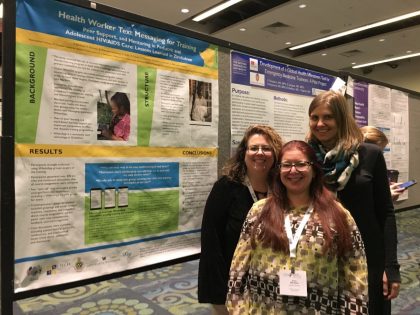
I-TECH Zimbabwe’s Vivian Bertman shared results on the use of text messaging as a low-cost, sustainable platform for building health care worker skills and knowledge to care for children and adolescents with HIV.
The research, titled “Health Worker Text Messaging for Training Peer Support, and Mentoring in Pediatric and Adolescent HIV/AIDS Care: Lessons Learned in Zimbabwe,” assessed the use of WhatsApp in a blended learning program. Participants used the app for peer-to-peer learning and support, generating over 300 entries, continuing discussions after course completion, and creating spin-off groups, including a support group for teens.
Highlighting the flexibility of cost-effective e-learning approaches was an oral presentation by eDGH’s Leslie Wall and Anya Nartker titled “No internet? No problem! Creative approaches to cost-effective e-learning delivery in resource-constrained settings.” The research looked at five tablet-based training programs developed by eDGH, in partnership with I-TECH, and delivered in Namibia, Tanzania, and Zimbabwe.
For participants, time spent off the job decreased from four days to less than one day, and within training programs that used text messaging to keep learners engaged, all participants finished in the time allotted. The team plans to expand learning activities and incorporate additional real-time interactions via text-message-based discussion groups or added face-to-face interactions.
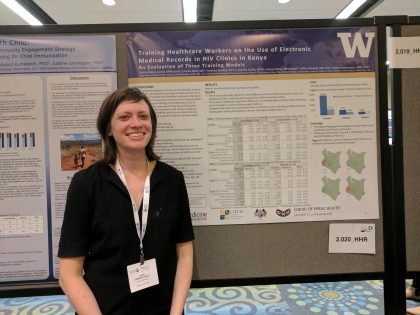
Caitlin O’Brien-Carelli, an MPH graduate from the UW Global Health program, explored additional sustainable training models. O’Brien-Carelli presented her MPH thesis work on behalf of I-TECH: “Training Healthcare Workers on the Use of Electronic Medical Records in HIV Clinics in Kenya: An Evaluation of Three Training Models.”
During I-TECH Kenya’s first years of training health care workers to use the KenyaEMR system, the team adjusted its training from 5 days to 3 days, and moved the training from off-site to on-site, to increase sustainability and maintain effectiveness. Results confirmed that with the adjustments, training quality was maintained, more people in more facilities were trained, and costs were reduced significantly.
Detailing innovations on the operations front, I-TECH HQ Managing Director Rob Lindsley presented at a conference satellite session titled “Global Operations 2017: Tools for Faculty & Administrative Leaders.” Lindsley’s presentation, “It’s About How Hard You Can Get Hit and Keep Moving Forward: Global Support and PLC Registration in India,” outlined I-TECH’s complicated, creative pathway to country office registration in India.
HIV/AIDS Community Mourns the Loss of Samuel Tadesse
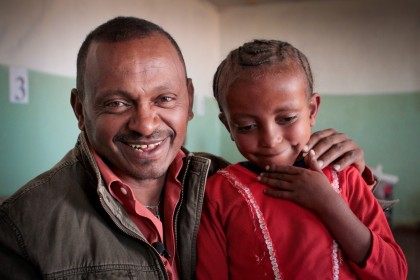
On January 25, Ethiopia, and the world, lost a treasured advocate and leader in the fight against HIV/AIDS: Samuel Tadesse.
Samuel, who discovered he was HIV positive in 2004, turned his diagnosis into action, founding the Debre Mitmaq Association at the Tsadkane holy water well. The Association is a partnership between the Orthodox Church and secular efforts to encourage antiretroviral therapy (ART) for those infected. It is a crucial alliance that has resulted in a shelter providing HIV testing, counseling, ART, and care for more than 1,300 people. More than that, it is a community of love, support, and rehabilitation. Read more about Samuel’s work with I-TECH at the Tsadkane holy water well.
Samuel Tadesse — and his enthusiasm, selflessness, and determination — will be greatly missed.
The following video was created by Theo Angell and Maria Gargiulo during a February 2011 visit to the well:
Ethiopia- Debire Mitimak – More than Holy Water from Theo Angell on Vimeo.